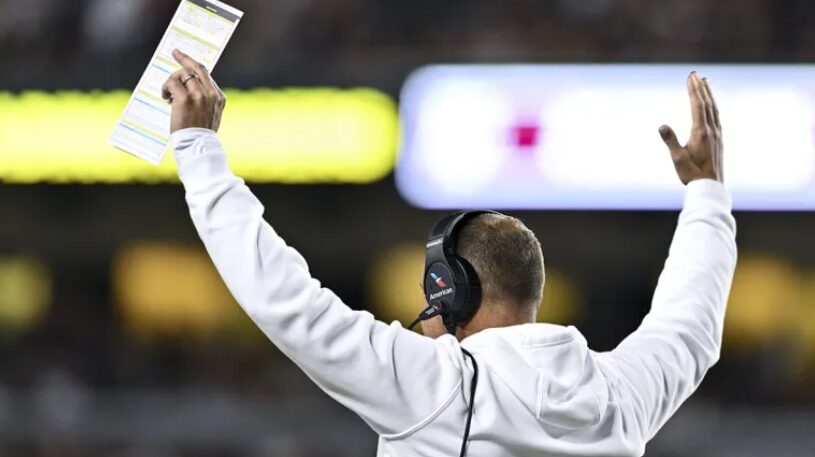Not a Surprise-Texas head coach Steve Sarkisian’s brutally honest take on Diego Pavia’s eligibility ruling
It’s safe to say Steve Sarkisian is quite unhappy with the ruling.
The NCAA’s decision to grant Vanderbilt quarterback Diego Pavia an extra year of eligibility has ignited significant controversy, with Texas Longhorns head coach Steve Sarkisian being one of the most outspoken critics. This ruling, resulting from a federal judge’s injunction against an NCAA bylaw that counted junior college (JUCO) years toward eligibility, could establish new precedents that might alter college football eligibility regulations in the future.
Sarkisian was straightforward in his criticism during a press conference, voicing strong disapproval of the decision.
“I completely disagree with the… ruling on this,” Sarkisian stated. “We chose to go to junior college football; that’s where we wanted to start our careers. So, I really don’t understand this at all. Are we going to have players who are 28 or 29 years old playing college football? What’s the purpose? I don’t get it. I don’t understand it. I fully disagree with it.”
Pavia’s situation has sparked discussions about how eligibility rules should apply to JUCO athletes. The Vanderbilt quarterback started his college journey at New Mexico Military Institute, then transferred to New Mexico State, and finally to Vanderbilt. Typically, under standard NCAA regulations, Pavia would have run out of eligibility. However, his lawsuit contended that JUCO seasons should not be counted against his total, as it limits his capacity to take advantage of name, image, and likeness (NIL) opportunities.
Texas’ Steve Sarkisian is furious with the courts ruling

Federal Judge William Campbell ruled in favor of Pavia, granting him an injunction that permits him to play in 2025. The NCAA, on the other hand, vehemently opposed this decision, expressing concerns about possible disruptions to the sport.
“The NCAA is disappointed by today’s ruling and aims for all student-athletes to fully utilize their name, image, and likeness opportunities without jeopardizing the chances for future student-athletes,” the organization stated. “Changing the enforcement of rules that have strong backing from NCAA member schools creates an even more unstable environment.”
Sarkisian is worried about the wider implications of the ruling. He pointed out that older players might gain an advantage in the game, which could limit opportunities for younger athletes.
The NCAA’s decision to appeal this ruling could lead to lengthy legal disputes, but the precedent established by this case is already shaking up college sports. If the ruling is upheld, it could allow more JUCO players to challenge eligibility rules, potentially altering the recruiting landscape.
This debate highlights the larger issue of finding a balance between fairness and opportunity in the fast-changing world of college sports. As the NCAA navigates the complexities of NIL deals and player rights, rulings like Pavia’s could further complicate this tumultuous period for collegiate athletics.



No Comment! Be the first one.